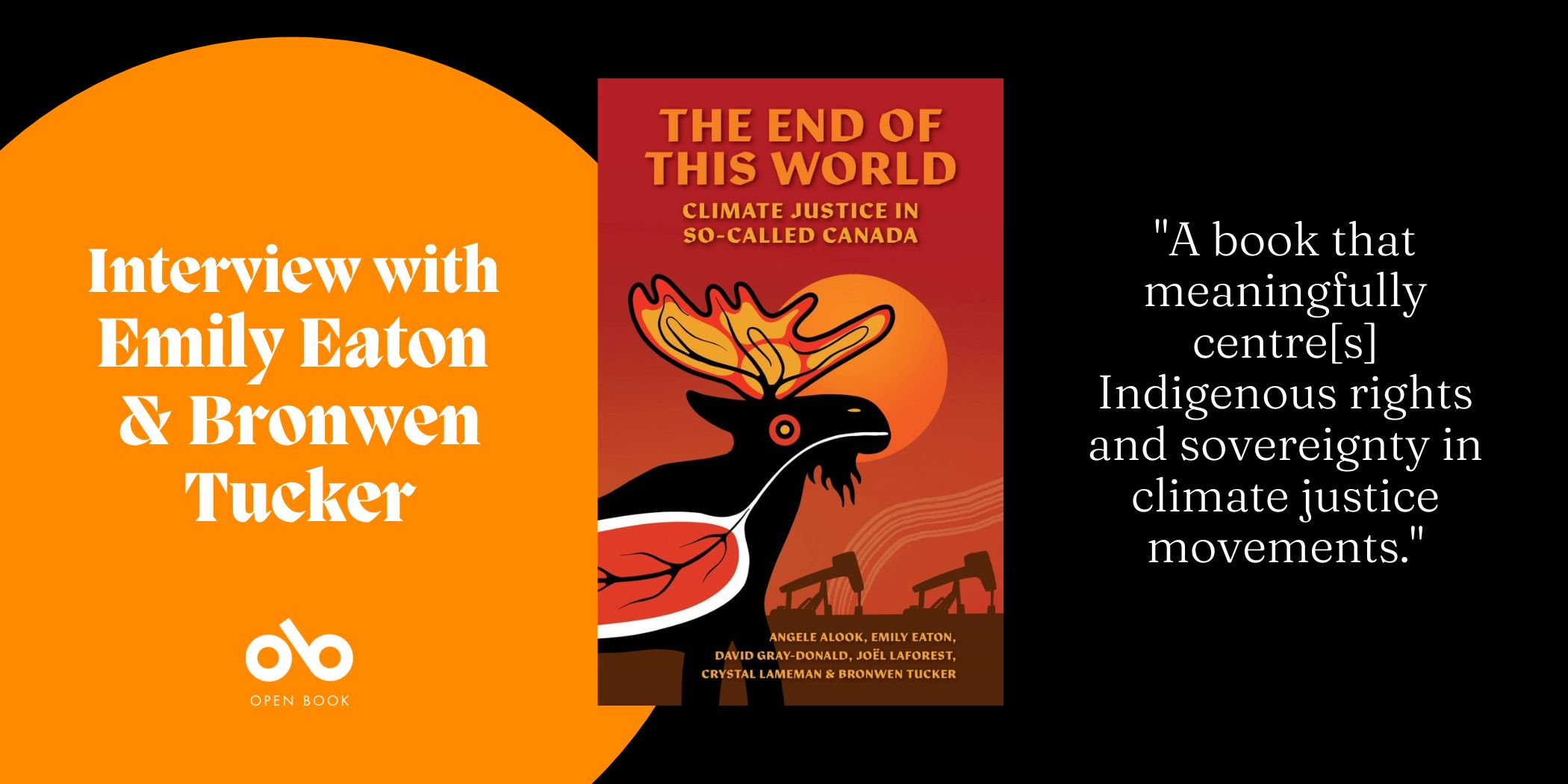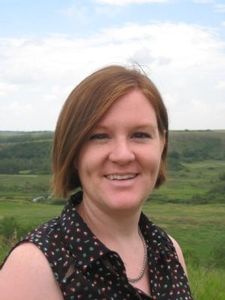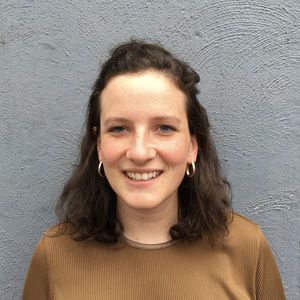Emily Eaton and Bronwen Tucker on the Climate Crisis & Why the World As We Know It Is (and Must Be) Over
The End of This World: Climate Justice in So-Called Canada (Between the Lines Books) by Angele Alook, Emily Eaton, David Gray-Donald, Joël Laforest, Crystal Lameman, and Bronwen Tucker is a clarion call for readers to wake up to the inevitability of the modern world's underpinning collapsing – and a reminder that that isn't a bad thing. In a system that was built on land theft, colonialism, and fossil fuels, they argue there is no way, ethically, environmentally, or practically, for the current system to operate indefinitely.
Their sharp, wise criticisms are on point, and the potential solutions they offer conjure hope for a better future that is more sustainable as well as more equitable. Taking the perspective that Indigenous sovereignty and climate justice naturally work together, the authors draw on combined decades of experience in activism, labour relations, community engagement, and more, leapfrogging the weakly-brewed solutions that are often presented. Instead, they radically envision a post-oil society in which wealth is redistributed and where Indigenous land is returned to its ancestral owners.
Today we're speaking with authors Emily Eaton and Bronwen Tucker to learn more about how the book came together and how their roadmap to the future was formed. They tell us about their vision for a "just transition" from our current system, about the fascinating details that came up in their research regarding early European settler attitudes towards child-rearing (that are still reflected in our social values today), and the tricky but rewarding act of writing a book while working as full time activists and advocates in their respective communities.
Open Book:
Tell us about your new book and how it came to be. What made you passionate about the subject matter you're exploring?
Emily Eaton:
We are a group of six authors who have been working at the intersection of climate justice and Indigenous rights in our nations, in the labour, student and environmental movements, and in institutions of media, non-governmental organizations, and academia. We came together to write this book because our governments and institutions of political power, despite nice rhetoric about reconciliation and climate action, are accomplishing very little. Instead, as we show in the book, they are reinforcing the status quo of denying Indigenous rights and sovereignty, upholding social inequality, and continuing to allow fossil fuel industries to threaten our collective futures.
In the book we argue that it is time to step up our efforts at collaboration across social movements and we propose a vision for a “just transition” to a world where we actively repair relationships to each other and the land. Importantly, we also lay out possible paths to achieve it. We saw an important need for a book that meaningfully centred Indigenous rights and sovereignty in climate justice movements and at the same time worked through strategy about how to win this just transition.
Bronwen Tucker:
One part of the book that I think is quite unique is that we spend a lot of time on the ‘how do we get there’ question and try to give people really tangible advice on how to become involved in collective action. I think most of us are deeply conditioned to think in either individualistic or really linear or formal ways about social change, like recycling, voting, or writing to elected representatives. But in practice, most deep social change has come from social movements and I think there are more tangible, rewarding, and diverse ways to get involved in this kind of work than is often initially clear. I think hopefully our book helps make readers not just excited about just transition but gives them real tools to help make one happen.
Open Book:
What was your research process like for this book? Did you encounter anything unexpected while you were researching?
EE:
Our research process involved almost weekly meetings for two years where we worked through outlines of chapters and shared what each of us brought to the chapter theme. We also interviewed each other to get to know our own stories and contributions better and we interviewed a few key people who could help to fill out our knowledge of the issues. Between the six of us we had knowledge of and access to many different sources including our own life histories living in oil-producing communities and organizing on the issues at the centre of the book, knowledge keepers in Indigenous communities, and first hand research in Indigenous and non-Indigenous communities. Beyond this we also drew on more typical sources like reports from non-governmental institutions, and academic literature.
BT:
It is probably a bit trite to say, but each of us have different experiences and areas of expertise so the research and writing process was both very fulfilling and very full of surprises! As a settler, one piece that has really stuck with me was from some of Angele’s writing on early European settler attitudes towards child-rearing, which comes up in the chapter about building a care economy with policies like accessible education, childcare, healthcare, and four-day work weeks. There are some primary-source passages from early European settlers speaking about how Cree and Iroquois peoples had an “excessive love and nurturing of their offspring,” calling this a “pathetic trait.” It was shocking from the perspective that I don’t think many settlers or really anyone else in our society would say something like this out loud today, but since I first heard it it has been impossible not to draw the line straight from these views to the way Canada treats children structurally – from the lack of affordable daycare access to separating poor and Indigenous children from their families through to prioritizing short-term oil and gas profits over our children’s future.
Your CanLit News
Subscribe to Open Book’s newsletter to get local book events, literary content, writing tips, and more in your inbox
Open Book:
Do you remember the first moment you began to consider writing this book? Was there an inciting incident that kicked off the process for you?
BT:
We each have our own answers for this too, but the bigger picture answer is probably just that our co-author David had started working in book publishing and so he was thinking about gaps in the literature! He was learning about the role nonfiction books can play in media discourse and popular education, and thought an accessible book that gives a real roadmap to climate justice and Indigenous sovereignty in so-called Canada – and counters the really limited and tepid ways most of our government and media speaks about these issues – was a bit of a gap. There had just been a wave of similar books like A Planet to Win, The Red Deal, and A People’s Green New Deal aiming to do something like this in other geographical contexts or with less of an Indigenous rights focus so his pitch seemed compelling!
I think an exciting outcome, because of relationships David already held from doing work on this issue, is that it’s a team of people where many of us would not have otherwise written a book, at least at this point in time, because we are really embedded in work in our communities. It made it really hard to find time to write but I think hopefully we can lend some more direct lessons and perspectives that do not often get written up in this form!
Open Book:
What defines a great work of nonfiction, in your opinion? Tell us about one or two books you consider to be truly great books.
EE:
A couple books that have stuck with me include Aimee Craft’s history of Treaty 1 and Jean Teillet’s history of the Metis. I think a truly great book opens up a new way of seeing and provides a framework for understanding, in a new way, the relationships around you. These books did this for me because they articulated how Indigenous peoples understood Treaty, nationhood, and Canada. They provided detail I needed to better understand the long history Indigenous sovereignty in these lands.
BT:
Some of the nonfiction books that have stuck with me most have come from authors really embedded in social movement work and interested both in questions of not just “what is the problem?’ but also the how of collective action to solve it! I think Undoing Border Imperialism by Harsha Walia is one of the best I have read that crosses both of these.
Open Book:
What are you working on now?
EE:
We are continuing to do the work that brought us to this project, but I think for all of us it’s with a deeper commitment and understanding of our strategies.
BT:
And specifically, there are some exciting ones readers can follow! Crystal is working on the Beaver Lake Cree Nation Supreme Court case we discuss in the book, which is the first case to be heard that argues that the cumulative impacts of oil sands and other industrial development on their land are a Treaty right infringement. Historically, the courts have only allowed cases considering a single project at a time, so this could unlock a critical legal precedent for other Indigenous peoples to use to protect, reclaim, and remediate their lands. David is working on The Grind, a new independent magazine that’s distributed for free on public transit in Toronto, a really exciting way to reach a broader audience with public interest news. Emily is helping run the Treaty Land Sharing Network, which connects farmers and other landholders with First Nations and Métis people needing safe access to land to practice their way of life.
_____________________________________________
Angele Alook is an assistant professor in the School of Gender, Sexuality, and Women’s Studies at York University. She is a proud member of Bigstone Cree Nation in Treaty Eight territory, where she has carried out research on issues of sociology of family and work, resource extraction, school-to-work transitions, Indigenous identity, and seeking the good life (miyo-pimatisiwin) in work-life balance. Her current research examines a just transition away from fossil fuels. She is an active member of the labour movement and a former labour researcher in the movement.
Emily Eaton is a professor in the department of geography and environmental studies at the University of Regina, in Treaty Four. She is a white settler doing research, teaching, and service devoted to addressing the climate and inequality crises at local and national scales and mapping pathways to transition that rectify the unjust colonial relationship that Canada has with Indigenous Peoples and marginalized communities.
David Gray-Donald is a media worker, fundraiser, and climate justice advocate living in Toronto. He was the publisher of Briarpatch Magazine in Treaty Four (Regina, Saskatchewan) until 2019, and co-founded Resource Movement, a group of young people with class privilege or wealth working toward the redistribution of wealth, land, and power. He is an editor with the Media Co-op and recently co-launched a free alt magazine in Toronto, The Grind.
Joël Laforest is a writer, researcher, and organizer living in Calgary (Treaty Seven), and a producer and founding member of the Alberta Advantage podcast. His research critically examines the history of social democratic politics in Canada, and his writing has appeared in Briarpatch Magazine, Canadian Dimension, The Sprawl, and Jacobin.
Crystal Lameman is a nêhiyaw mother of two and a proud member of the ᐊᒥᐢᑯᓵᑲᐦᐃᑲᐣ ᓀᐦᐃᔭᐃᐧ ᐯᔭᑰᐢᑳᐣ ᐅᐢᑌᓯᒫᐅᐧᔭᓯᐁᐧᐃᐧᐣ ᓂᑯᑖᐧᓯᐠ amiskosâkahikan nêhiyaw peyakôskân, ostêsimâwoyasiwêwin nikotwâsik Beaver Lake Cree Nation, Treaty Six, where she currently works as the government relations advisor and treaty coordinator. She is a researcher; policy analyst; and passionate Indigenous rights, Treaty, and environment defender, with a graduate degree in educational policy studies. She is currently pursuing a graduate degree in counselling psychology. Crystal’s work is centred on the advancement of Indigenous economic, energy, and food sovereignty, and the realization of holistic wellness through her nêhiyaw ways of knowing and meaningful land-based practices.
Bronwen Tucker is a researcher at Oil Change International and a community organizer with Climate Justice Edmonton. She got involved in politics through free tuition, fossil fuel divestment, and anti-austerity work as a student organizer in Tiohtià:ke (Montreal), and now calls ᐊᒥᐢᑿᒌᐚᐢᑲᐦᐃᑲᐣ Amiskwacîwâskahikan Beaver Hills House (Edmonton) home.







